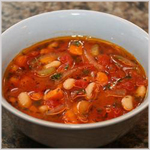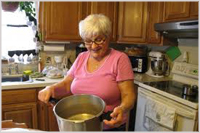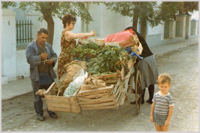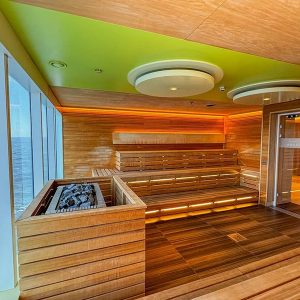 Ice and snow can be so pretty, but not everyone enjoys winter weather. Some people certainly do, however.. But after a snowball fight, or a mass toboggan slide, what does everyone go home for?
Ice and snow can be so pretty, but not everyone enjoys winter weather. Some people certainly do, however.. But after a snowball fight, or a mass toboggan slide, what does everyone go home for?
Why, a spot of comfort food of course. Comfort food can be savoury or sweet, is preferably hot, has steam rising from it, looks and smells divine. It can be good for you but, more importantly, it should cheer you up.
Depending upon your homeland, actual or spiritual, you probably think about food you grew up with, lovingly made for you by your mother. According to one website, one of the favourite comfort foods in Finland is sautéed reindeer. This conjures up a picture of a very muscular woman frying a whole reindeer carcass in a very, very large skillet, but I feel something must have been lost in translation. I remember with fondness my own Mum's shepherd's pie and steak and kidney pie.
For every woman married to a Greek, comfort food means fasolada and, no, you can never hope to equal his mother’s. But you can have a good try, and with some subtle additions and variations, you may even one day hear the grudging words: ‘As good as my mother’s.’
‘Better than my mother’s’ is an unlikely accolade, but it is possible to achieve that glory, so persevere.
 A good fasolada is not only comforting, it is nourishing, satisfying, and you can make enough of it to last for two or even three days without the family (i.e. your man) demanding something fresh every day. In fact, fasolada matures so that by the third day it is at its best – gutsy and chunky. I was taught by my own mother that it was essential to keep a well-stocked cupboard of basic foodstuffs, a habit that I have always maintained. I was quite shocked to find, on coming to live with my Greek mother-in-law, a paragon of housewifely virtues, that she shopped every day for the makings of that day’s main meal. Off she would trot, bright and early, to the grocer and the baker. Meat was a once-a-week affair anyway. Fish and vegetables and fruit could be bought from wizened and weather-beaten little men leading ramshackle carts drawn by wizened little donkeys. That was 1970, in a part of Piraeus inhabited by people who had had to struggle to make ends meet ever since their families arrived in Greece as refugees from Asia Minor. I started married life living with my mother-in-law, without a fridge or a washing machine or a TV. We had ice-boxes, and spent a whole day boiling up water and washing clothes using almost Biblical methods, and the nearest TV was in the cafeneion down the road. But that is a story for another time. I digress – it is all too easy. When you get to my age you either live in a dream or you relive your life constantly.
A good fasolada is not only comforting, it is nourishing, satisfying, and you can make enough of it to last for two or even three days without the family (i.e. your man) demanding something fresh every day. In fact, fasolada matures so that by the third day it is at its best – gutsy and chunky. I was taught by my own mother that it was essential to keep a well-stocked cupboard of basic foodstuffs, a habit that I have always maintained. I was quite shocked to find, on coming to live with my Greek mother-in-law, a paragon of housewifely virtues, that she shopped every day for the makings of that day’s main meal. Off she would trot, bright and early, to the grocer and the baker. Meat was a once-a-week affair anyway. Fish and vegetables and fruit could be bought from wizened and weather-beaten little men leading ramshackle carts drawn by wizened little donkeys. That was 1970, in a part of Piraeus inhabited by people who had had to struggle to make ends meet ever since their families arrived in Greece as refugees from Asia Minor. I started married life living with my mother-in-law, without a fridge or a washing machine or a TV. We had ice-boxes, and spent a whole day boiling up water and washing clothes using almost Biblical methods, and the nearest TV was in the cafeneion down the road. But that is a story for another time. I digress – it is all too easy. When you get to my age you either live in a dream or you relive your life constantly.
 What I am saying is that, in spite of life becoming so much easier in some ways, it still doesn’t hurt to keep a well-stocked cupboard, and that stock, when you intend to cook Greek dishes, should include dry goods like beans, lentils, pasta, flour and rice, tomato paste and of course olive oil, with a regularly replenished supply of vegetables in the fridge. Thus, on a miserable, cold, wet day like today, you wouldn’t have to go out shopping for the makings of a meal. As with so many Greek recipes, there is a certain mystique about fasolada.
What I am saying is that, in spite of life becoming so much easier in some ways, it still doesn’t hurt to keep a well-stocked cupboard, and that stock, when you intend to cook Greek dishes, should include dry goods like beans, lentils, pasta, flour and rice, tomato paste and of course olive oil, with a regularly replenished supply of vegetables in the fridge. Thus, on a miserable, cold, wet day like today, you wouldn’t have to go out shopping for the makings of a meal. As with so many Greek recipes, there is a certain mystique about fasolada.
You need the right kind of beans, not too small and not big – most recipes state haricot beans, but cannellini beans are the right ones (navy beans in the US), or the ones called handres in Greek. You need water that will actually soften the beans – tap water is generally considered ineffectual, bottled water is preferable, but real aficionados keep a supply of water collected by their own fair hands from some spring or other source with a good reputation.
 You must, of course, use good oil, preferably from your own trees or failing that, from a neighbour, relative or good friend’s trees. Be generous with it, it makes all the difference. Dried beans, plenty of sliced or chopped onion, celery, parsley, sliced carrots, oil and tomato paste, salt and pepper – basically that’s it. Some people like their vegetables finely diced and grated, others prefer them more coarsely sliced and chopped. The results will be different according to how you treat the vegetables. There are plenty of recipes on line and in the many Greek recipe books, and if you are wise, you have written down mother-in-law’s version somewhere.
You must, of course, use good oil, preferably from your own trees or failing that, from a neighbour, relative or good friend’s trees. Be generous with it, it makes all the difference. Dried beans, plenty of sliced or chopped onion, celery, parsley, sliced carrots, oil and tomato paste, salt and pepper – basically that’s it. Some people like their vegetables finely diced and grated, others prefer them more coarsely sliced and chopped. The results will be different according to how you treat the vegetables. There are plenty of recipes on line and in the many Greek recipe books, and if you are wise, you have written down mother-in-law’s version somewhere.
Variations
Add some dried chili flakes and seeds (called ‘boukovo’ in Greece), and/or a few drops Tabasco (can be added after serving). My daughter adds small pieces of fresh sweet red pepper. I used to add some bacon, or sliced sausage, or even cubes of left over pork chops – this soup cries out to be complemented by the flavour of pork.
 Tips
Tips
You must throw away the first lot of water, used for the initial stage of boiling the beans on their own. Use fresh water to continue the recipe. Do not add salt until the end – it can harden the beans.
Serve with: olives, slices of feta drizzled with olive oil and sprinkled with rigani (oregano), red pepper or black pepper, crusty bread and a glass or two of sturdy red wine. My husband always accompanied his fasolada with slices of red onion and renga (smoked herring).
Kali orexi!
For more stories about life in Greece, please visit Angela’s Blog











